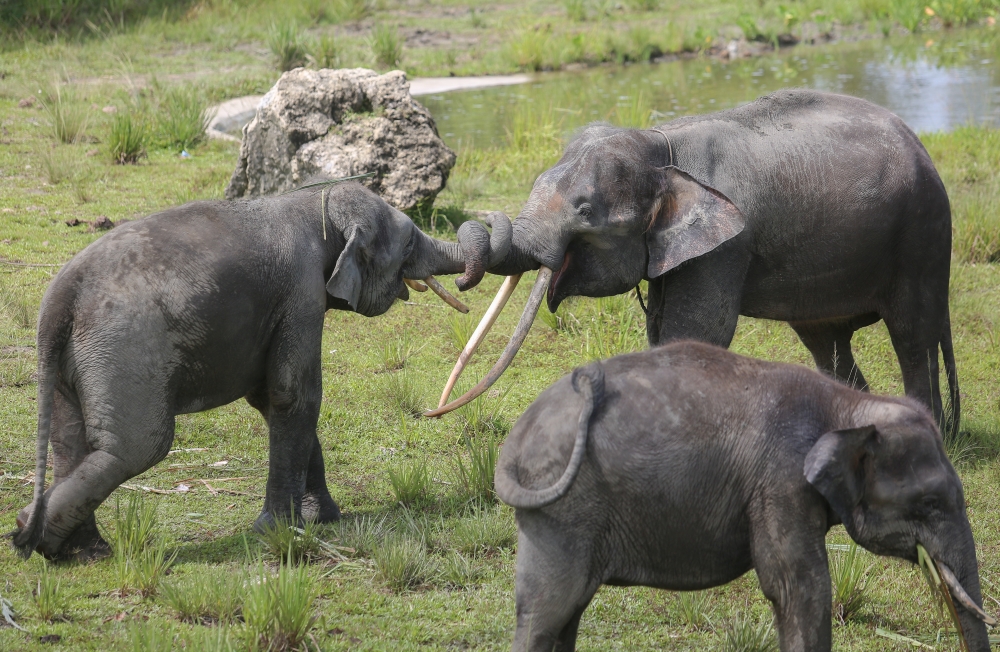JULY 6 — Known as the smallest elephants in the world, it has now been recently updated by IUCN that the Bornean Pygmy elephant has been officially recognised as a subspecies of the bigger Asian elephant and classified similarly as endangered species in the Red List of Threatened Species.
Since the establishment of Malaysian Palm Oil Green Conservation Foundation (MPOGCF) in April 2021, the priority has been, among others, to resolve the wild elephant issue that has always been linked to the oil palm plantations. Recognising the seriousness of the human-elephant conflict in Sabah, the foundation is collaborating with state agencies, including Sabah Wildlife Department (SWD), local university researchers, non-governmental organisations (NGOs) and the plantation industry, to encounter the most efficient way to mitigate the issue.
At present, MPOGCF is working together with SWD and Universiti Malaysia Sabah (UMS, led by Dr Nurzhafarina Othman) to study and survey the current population of Bornean Pygmy elephants throughout Sabah. This study, which started in December 2023, aims to determine the current population number despite the IUCN Red List estimate at 1000, with about 400 being breeding adults.
This is part of MPOGCF effort and support to obtain the latest statistics and evaluate the effectiveness and improvement of conservation programmes especially in the oil palm plantations. This data will hopefully also contribute to the Sabah Borneo Elephant Action Plan 2020-2029 that will provide direction and guidance on strategies, priorities and conservation actions for this endangered species at the state level.

MPOGCF is also taking the important role in conducting a research collaboration with SWD, Universiti Putra Malaysia (UPM) and Sabah Softwoods Berhad (SSB) with planting Napier grass, within the existing wildlife corridor in Brumas – Sabah Softwoods Berhad. This corridor is important for mitigating the risk and fostering the human-elephant co-existence, with the goals of reducing crop damage and increasing the safety of SSB plantation workers as well as the Bornean Pygmy elephants in the agricultural landscapes. The establishment of elephant corridors within the SSB plantation is an initiative in line with the state Tourism, Culture and Environment Ministry to enhance the protection of the species through the creation of elephant corridors.
This study will also look at the Napier grass effectiveness as plant species consumed by elephants within the wildlife corridor, and how efficient it would further entice them to utilise these corridors to establish new migratory routes and home ranges in safe areas, thus reducing the possibility of human-elephant conflict. The MPOGCF believes that supporting this initiative in Sabah will promote the concept of living in harmony with the Bornean Pygmy elephant and provide an effective long-term solution to address the human-wildlife conflict.
Since 2022, MPOGCF has launched a campaign called “The Other Malaysian: Living Together in Harmony”. This campaign aims to encourage oil palm plantation owners to coexist with wildlife within their plantation landscape, especially with the elephants. The Malaysian palm oil industry is going through a transformation phase in becoming more sustainable and more wildlife friendly. Many efforts have been taken by individual companies and MPOGCF has taken the responsibility to support and lead any conservation initiatives to be undertaken by the Malaysian palm oil industry. It is also the responsibility of all scientists and wildlife experts around the globe to help guide the industry to stay on the right path of biodiversity conservation.
* Daniel Pamin is a conservation executive with the Malaysian Palm Oil Green Conservation Foundation who oversees its conservation projects and programmes in Sabah.
** This is the personal opinion of the writer or publication and does not necessarily represent the views of Malay Mail.





















